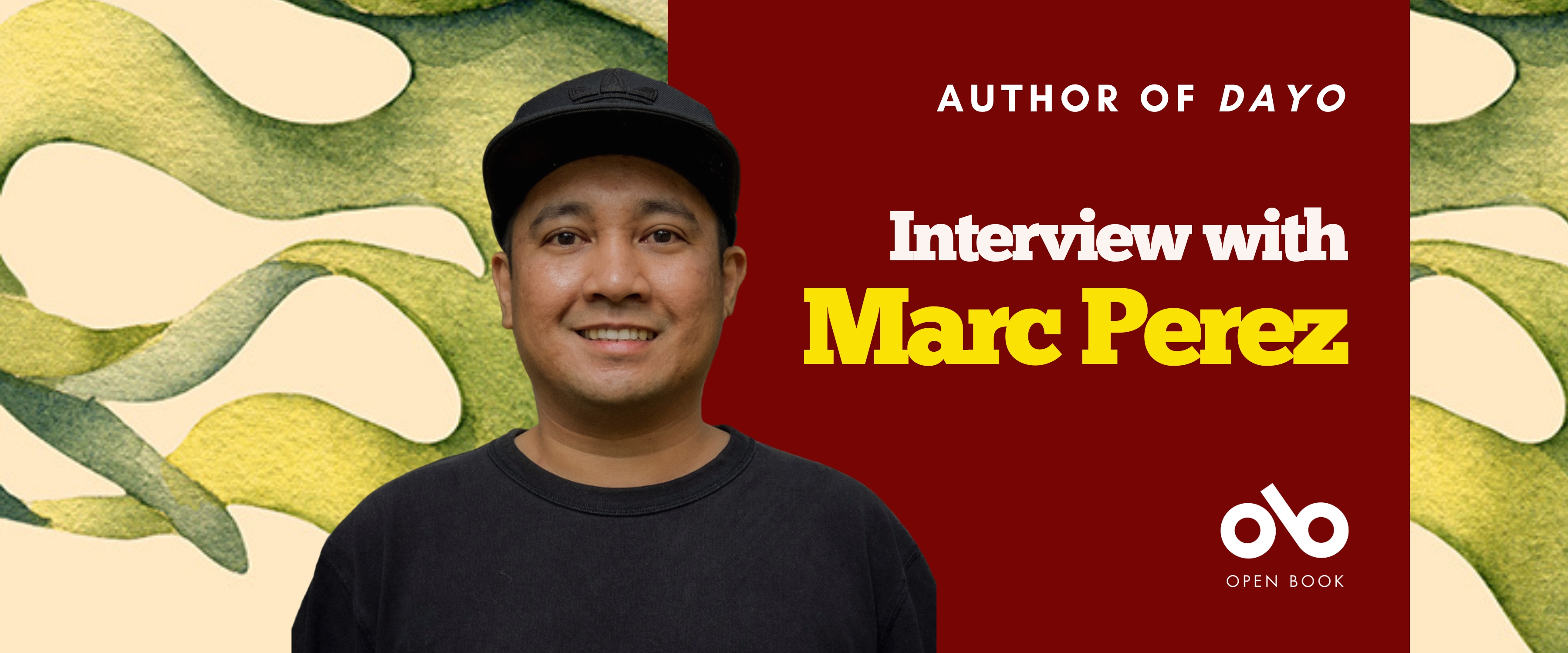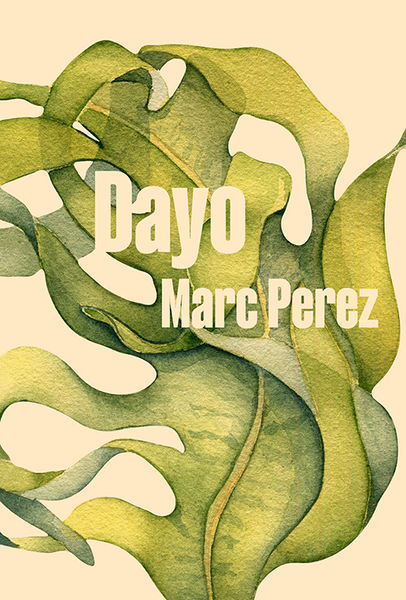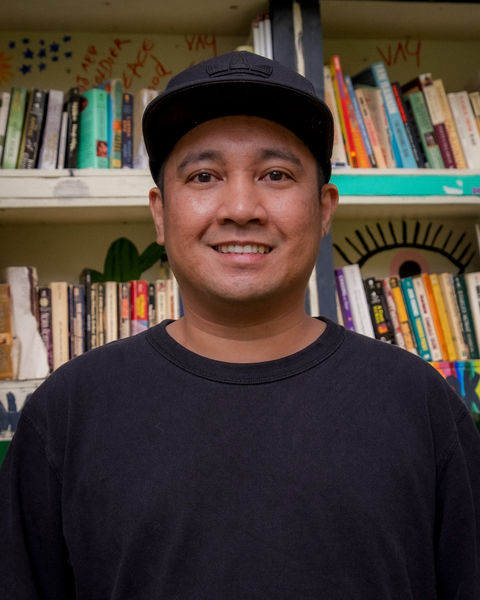Marc Perez Follows the Paths of Strangers and Wanderers in Dayo
Identity, language, and self are all at play in Dayo (Brick Books), the new collection of poetry from Marc Perez. It's a striking debut from the author, and one that explores what it truly means to belong.
The title is a Tagalog word that refers to someone who exists in a place not their own; a wanderer or stranger. Perez found inspiration in using another language, with all of its nuance and uniqueness, to imbue the collection with meaning that simply could not be found through the use of English alone. The result is a series of poems that are linked in theme and tone, all facing the ways that "strangers" may fit into colonized societies, with all of the violence inherent therein.
Instinctive and lyrical lines also set these poems apart, and lend the work a curious and vibrant spirit that reflects the journey of a dayo trying to find their place in the world, and plant delicate roots wherever they finally may settle.
Perez spoke to Open Book about the collection in a thought-provoking Line and Lyric interview, and we're delighted to share it with you here!
Open Book:
Can you tell us a bit about how you chose your title? If it’s a title of one of the poems, how does that piece fit into the collection? If it’s not a poem title, how does it encapsulate the collection as a whole?
Marc Perez:
Dayo is a Tagalog word meaning someone who exists in a place not their own. It is synonymous to wanderer or stranger. My manuscript originally had an English title about belonging. When my editor, Cara-Lyn Morgan, suggested using Filipino, I easily came up with dayo. The stranger as a speaker has been on my mind all along. I found it fascinating that when I began thinking in my native language and filtering the poems through the lens of a dayo, the collection suddenly revealed itself as a journey. The collection’s arc became much clearer to me. I went on to use Filipino words for section titles and even retitled some of the poems. Sara Ahmed is helpful in my understanding and use of the term dayo. To her, the stranger, rather than being unknown, is actually someone familiar and recognized as the “other.” She also points out that the word wretch historically means stranger or banished person. Further, she asks, Can we rewrite the history of happiness from the point of view of the wretch? More than state-sanctioned definitions of citizenship—that is, of exclusion and belonging—however, I use the poetics of dayo to explore my personal, temporal, and spatial relationship with place, along with all the sociocultural, economic, and political regimes that create, govern, and shape it. To me, the title means writing from the point of view of the colonized, those who have been forcibly displaced by imperialist wars and plunder, the working class, urban poor, the racialized, marginalized, or, as Fanon famously says, the wretched of the earth.
OB:
Did you write poems individually and begin assembling this collection from stand-alone pieces, or did you write with a view to putting together a collection from the beginning?
MP:
Yes, I wrote the poems individually. Years ago, when I started putting more time and effort into writing poems, a Filipino poet, Fidel Rillo, advised me to try writing at least five poems that relate to each other. I do that until now, though I rarely meet the target number. The poems might resonate with each other via subject, theme, imagery, or tone, and so on. I group them accordingly until the main thematic and stylistic threads reveal themselves to me and am able to use them to bind a collection together. While assembling Dayo, I removed some poems from the manuscript, because I felt that they didn’t fit in. There were also poems that I felt I needed to write and include to make the manuscript tighter. As such, completing the manuscript and submitting took longer, but at least, I was satisfied—indeed, happy—with the process.
OB:
What were you reading while writing this collection?
Your CanLit News
Subscribe to Open Book’s newsletter to get local book events, literary content, writing tips, and more in your inbox
MP:
My poems are mostly “after” poems. I adore intertextual poetry, so I often quote, respond, repurpose, and refer to the work of other writers. Poetry, in this sense, is a dialogue. There’s a list of writers, musicians, and artists in the book, which includes Roque Dalton, Hari Alluri, Etel Adnan, Philip Levine, Steffi Tad-y, among others. While writing the collection, I also remember reading and being moved by the poems of Ocean Vuong, Mercedes Eng, Ed Bok Lee, Adrian De Leon, Terrence Hayes, Ada Limon, to name a few.
OB:
Is there’s an individual, specific speaker in any of these poems (whether yourself or a character)? Tell us a little about the perspective from which the poems are spoken.
MP:
The speakers are mostly personas based on myself, the poet as a stranger. A perpetual wanderer who longs for home—in the past, present, and future—the speaker looks at things, places, and situations as if he’s seeing or experiencing them for the first time, layering images with discourses—on art, care, family, politics, economy, et cetera—that concern him. He reimagines and rearticulates memories that he deems dear and important.
However, in the last section of the collection, I intended to use multiple perspectives. At first, I tried writing it in a situated first-person perspective but found it too narrow. I used the third person but felt it too distant, suspicious. I felt stuck because I couldn’t find the proper voice. Perhaps I was making a mistake for thinking in terms of prose fiction and trying to mimic in poetry the free-indirect speech.
Then, when I pulled text from various sources (colonial literature, news articles, blogs, government document, among others), various voices expectedly emerged. Even the crocodile, whose tragedy informed the poem’s trajectory, began to speak. At the same time, I was aware that I, the poet, was ascribing—in this case, to a crocodile (a stand-in, going back to Ahmed, for the wretched)—an identity and voice. Ethically, I find the idea of “giving voice to the voiceless” suspect; I mean, everyone—perhaps everything—has a voice if we only pay attention and actually listen.
I attempted to acknowledge this contradiction in the last poem, where I used as an epigraph by Donna Haraway that states: But, of course, that infinite vision is an illusion, a god-trick. To me, the quote functions as a kind of estrangement, in Brechtian sense, which reminds the reader that yes, the crocodile isn’t really talking and going on a hunger strike, and if you strip the artifice off this poem, all that you will find is a dead crocodile in a world plagued by colonial and imperialist violence; environmental destruction; a world where people are dehumanized and forcibly displaced from their homelands. In other words, I included the quote to problematize the poet’s omniscience, exposing his anxieties about the limit or inadequacy of the poem’s polyphonic conceit.
OB:
What advice would you give to an emerging or aspiring poet?
MP:
I guess I would tell them things that I sometimes mumble to myself, which usually goes: be gentle on yourself, poet. Chill. Listen to some music. Different genres. Pick up the guitar. Learn another instrument. Draw something even though you’re bad at it. Writing poetry isn’t a job, but labour nevertheless: write even when it’s hard. Even when it’s painful, exhausting. But remember that not writing is okay, too. Yes, you can take smoke-breaks. Vape, if you will. Go easy on the whiskey—yes, high-balls too. Don’t forget to eat, drink water, rest. Take a nice nap. Stop sleeping on the couch. Ride your bike. Go for a hike, a swim, a walk. Or a photo-walk. If you can’t or don’t feel like it, do some stretching at least. Hang out with your friends, strangers. Talk to your comrades. Attend a political meeting, a rally—a Free Palestine rally. Study. Stay informed. Get back on your to-read list. Read expansively, critically. Stay on top of your house chores. Declutter your desk, your desktop. Submit to magazines, but don’t dwell on rejections, recognition. As always, focus on what to write and how to write it. Write because you need it: like air, you breathe it. Live. Experience things. Make time for observing, remembering, reflecting. Create space for stillness. You’re a writer already, and you know it.
OB:
What are you working on next?
MP:
I currently spend most of my writing time and energy on completing a short story collection. I’ve been writing and editing it on and off for a few years now, and it has been very challenging, to say the least. I’m in no rush, though. I’m also compiling a poetry collection. As a parent of two “third culture” children, I’ve been curious about the interactions between three distinct histories, languages, cultures—Filipino, Japanese, and Canadian—within out household. For now, the poems are mainly about family and various forms of domesticity. I’m still figuring out where these ideas and projects are headed.
_____________________________________________________________
Marc Perez is a Filipino poet and writer living in the unceded territories of the Musqueam, Squamish, and Tsleil-Waututh nations. His fiction, creative nonfiction, and poetry have appeared in The Fiddlehead, EVENT Magazine, decomp journal, CV2, PRISM international, and Vallum, among others. A recipient of grants from the BC Arts Council and Canada Council for the Arts, he has a BFA from the UBC School of Creative Writing. He is the author of the chapbook, Borderlands (Anstruther Press, 2020), and Dayo is his first full-length poetry collection.






